Will Aleppo finally fall to the Syrian army?
- Published
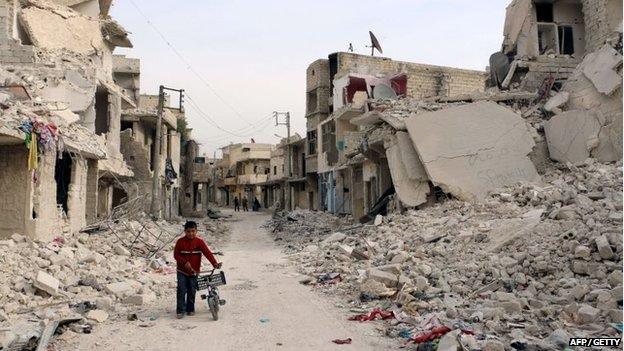
The Syrian army is surrounding rebel-held areas in Aleppo and cutting off supplies
On both sides of its divide, many now predict it is just a matter of time before Syria's second city falls.
And with it goes an icon of the uprising.
"It's a turning point," Adnan Hadad of the Aleppo Media Centre tells me in a Skype call after his most recent trip to eastern Aleppo.
That stretch of land is still held by an array of rebel forces, but Syrian troops are encircling it in a pincer movement to cut supply lines, an attempt to force surrender and defeat.
"It's the only big city controlled by moderate opposition groups and they're trying to keep the revolution going," he explained.
But the momentum in Aleppo now is widely seen to be with Syria's military, reportedly bolstered by fighters from Iran, Lebanon, and Afghanistan.
"Last year, it wasn't clear the regime would fight with all the resources and resolve necessary to keep [Aleppo]," one commentator in the city told me. "But they have."
Rebel ranks are weakened by infighting and distracted by other fronts against the Islamic State (IS) group that now controls large swathes of northern Syria, including a strategic approach to Aleppo.
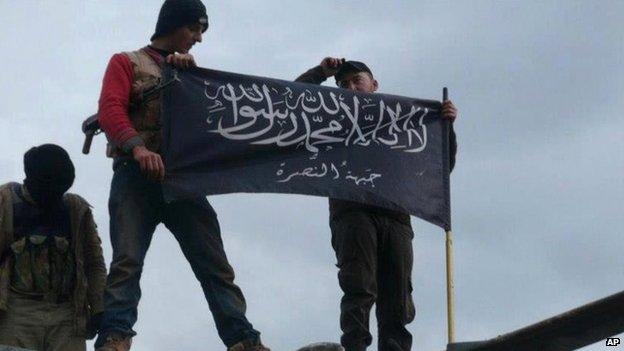
Rebels have been stretched by having to fight Islamist groups as well as the government
I was shown a series of maps compiled by an aid agency which illustrate the steady advance of IS in recent months, despite waves of airstrikes by Western and Arab states.
The defeat of more moderate forces here would be a major blow to a Western backed opposition that has long eyed Aleppo as a possible staging post for an advance further south.
Frozen zone?
"The fall of east Aleppo would most likely precipitate a spectacular collapse among rebel ranks and herald their end as an effective actor in the civil conflict," observes Edward Dark, one of the few journalists still in the city, in an article, external for Al Monitor.
Some believe this could be fertile ground for the UN's new plan for a "freeze zone," which aims to de-escalate violence through local truces and open a space to deliver humanitarian aid.
"The UN plan is controversial," Adnan Hadad explains.
"Some fighters want to avoid a long siege and are ready to accept a freeze, but others want to keep fighting."
The regime, scenting victory, is certain to refuse to stop its advance unless the situation is "frozen" to its clear advantage.
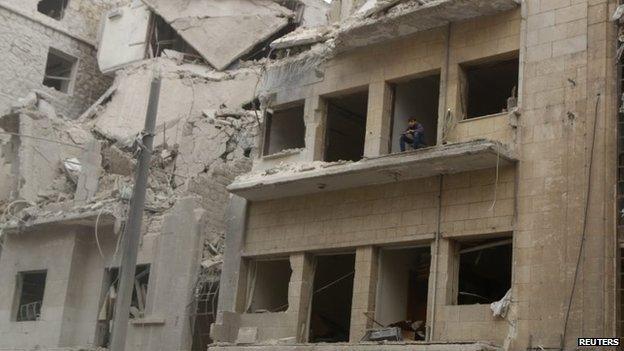
Heavy fighting has left many buildings uninhabitable in Aleppo but some families cannot leave
On a visit to Aleppo this week, the military took us to front lines where rebel fighters were recently pushed back.
In al-Arkub, deserted houses show all the ravages of recent battles.
Only a few families remain in the blocks, which are barely habitable.
"We can't afford to live anywhere else," 16-year-old Wael tells me.
He strides past a Syrian military post clutching plastic bags bulging with food that he has bought in an adjacent neighbourhood for family members waiting inside.
"There's been heavy fighting but it's better now," he says.
"Now there are soldiers just outside our door."
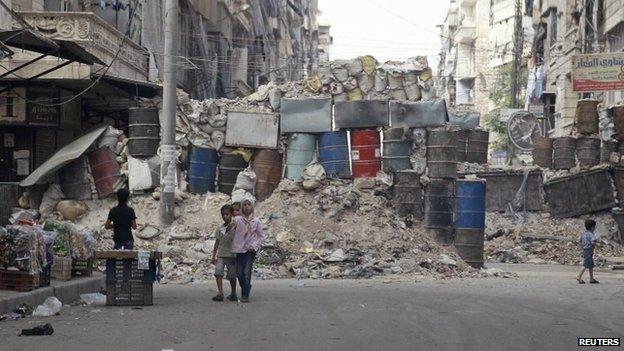
Children are amongst the 300,000 people still living in rebel held areas in Aleppo
On the northern edge of Aleppo, the Sheikh Najjar industrial zone, is also back in government hands.
But it is a desolate landscape of burnt out factories and heaps of twisted metal girders.
A warehouse near the entrance is still painted with the black flag of Jabhat al-Nusra and walls inside are daubed with graffiti.
"It's a suicide mission to travel there," asserts Fares Shehabi, who has just been re-elected as head of Aleppo's Chamber of Industry.
The chamber is now in business from an elegant villa in a leafy neighbourhood in central Aleppo.
Its old headquarters in a graceful mansion was blown to pieces by explosives detonated in one of the many underground tunnels used with devastating effect by the rebels.
Barrel bombs
On the road to the industrial zone, vehicles are diverted through a military barracks to avoid sniper fire.
Shehabi says he found his destroyed factories full of leaflets and other materials from IS fighters who used it as a "propaganda centre".
"We want the army to finish all of them off," he insists.
"The people of Aleppo have had enough."
I ask about the government's use of indiscriminate barrel bombs, which have caused widespread civilian casualties.
"Yes, unfortunately there are some civilian deaths, but these bombs are targeting all the terrorists," he insists as he lists the range of enemies including IS and al-Qaeda.
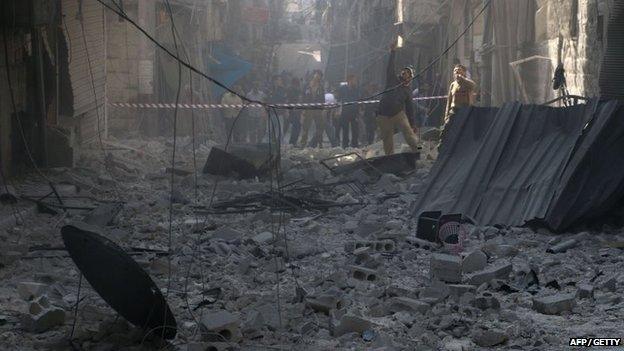
Barrel bomb attacks by government forces are devastating areas of the city
At Aleppo University, where the city's uprising began with peaceful protests in 2012, student lodgings have been transformed into a neighbourhood for the dispossessed.
It is now home to 40,000 people who have managed to escape more dangerous areas.
Traders have moved in with stalls selling food and cheap clothing, and there are swings and slides and a rusted Ferris wheel for the children.
Dunyia, a young teacher with sparkling eyes and a bright smile, gathers a noisy crowd of young ones around her to sing rousing songs.
But inside the narrow dark corridor of a student hall - in a small room with two bunk beds shared with three sisters, a young brother and her mother - resolve cracks.
"I'm tired, so tired," she sobs.
"I just want everything to go back to what it was. Everything is bad now."
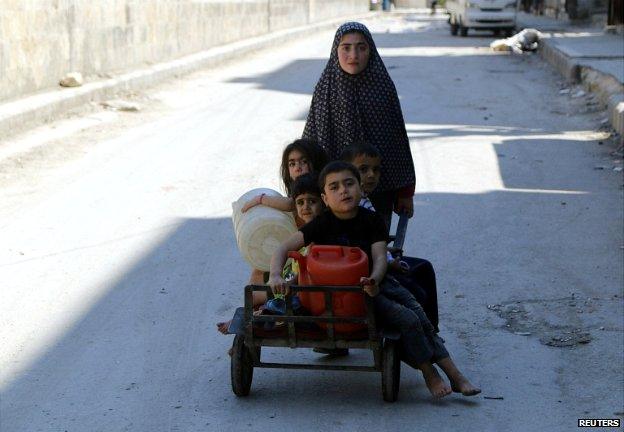
It is becoming increasingly difficult to deliver supplies to rebel-held areas
Dwindling energy
Some 400,00 Syrians have escaped to the safer side of the city but about 300,000 are said to be still living in neighbourhoods in rebel held areas.
Food is not scare yet but as a siege takes hold, prices are rising, and people have few means to survive.
"We're urging the government to give us access to all areas," says Matthew Hollingworth, who heads the UN World Food Programme in Syria.
UN agencies, working with the Syrian Arab Red Crescent Society, recently achieved some breakthroughs in crossing front lines, but access is still rare.
West Aleppo is still a place with tree-lined avenues and fine restaurants serving its fabled cuisine.
But at best, there are a few hours of electricity a day - no matter which side you live on.
And there is dwindling energy among its people to continue a fight that has cost far more than anyone in this city could have imagined.
In Syria's dark war, the fate of Aleppo now casts a long shadow.